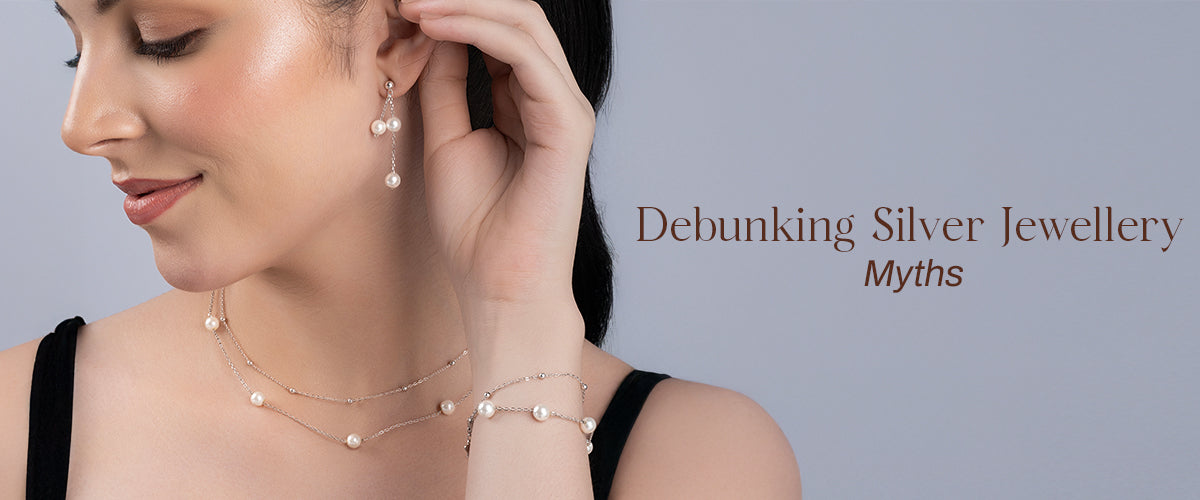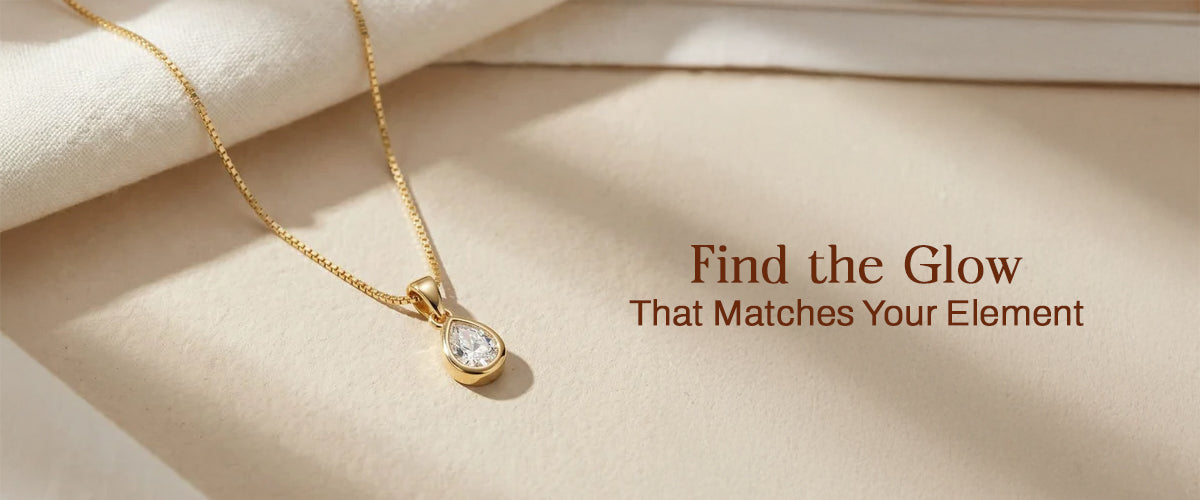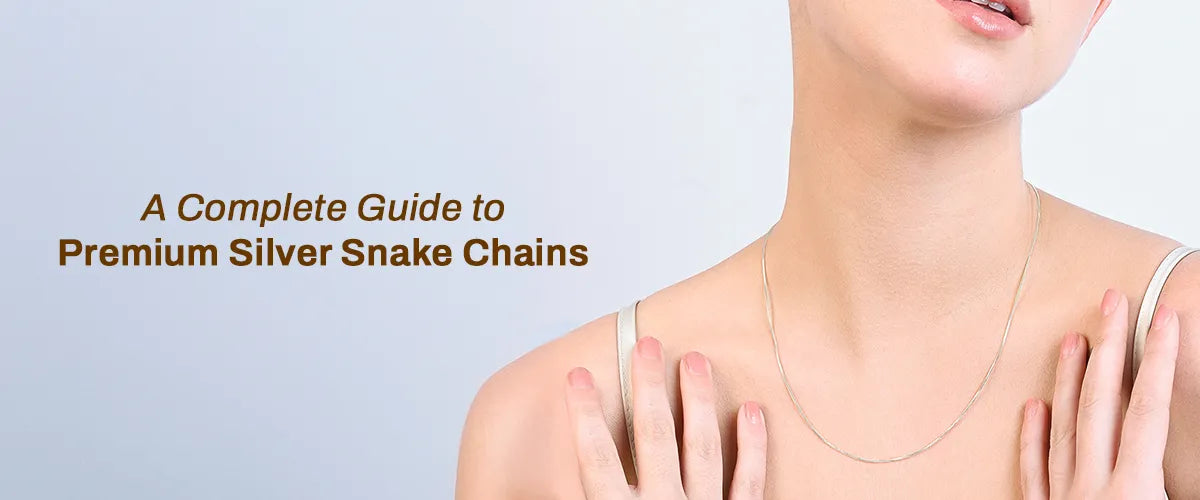Silver Jewellery Myths Busted: What Actually Works

Silver jewellery is a staple in many collections since it looks classic and goes with a lot of items. There are a lot of wrong beliefs going around about how to take care of it, even though it's fairly well known. The purpose of this blog is to clear up some of the most popular fallacies about how to care for silver and give you information based on science instead. We'll discuss frequent beliefs regarding how to clean, wear, and do other things in daily life.
Is Toothpaste Safe for Cleaning Silver?
-
Abrasive Nature: Toothpaste isn't useful for cleaning silver jewellery because it's abrasive. Most toothpastes include light abrasives, including hydrated silica or calcium carbonate. These are used to clean plaque and food off your tooth enamel. They're good for your teeth, but they won't work on sterling silver because it has a smooth surface.
-
Irreversible Surface Damage: You can get rid of rust, but these little scratches are too small to cure at home easily without the right tools. Putting toothpaste on silver actually eats away at its surface. A tiny layer is taken off, making the surface less smooth.
-
Residue Trapping: Toothpaste can leave a film on silver jewellery that adheres to the little fissures or engravings. This film not only looks ugly, but it can also attract dirt, cause the silver to tarnish faster, and be hard to get rid of without a vigorous rinse.
-
Damage to Gemstones and Finishes: There are a lot of gemstones set in silver. Like pearls, opals, and turquoise, many of them are porous and can be readily harmed by toothpaste. These softer stones can get dull, damaged, or even broken in a way that can't be restored.
Think toothpaste helps? Think again. Get the facts behind the biggest silver jewellery myths.
Can Silver Be Worn in Water?
-
Acceleration of Tarnish: The biggest difficulty is that silver that is worn in water rusts faster. Water, especially tap water, has minerals, chlorine, and other compounds in it. These things speed up the reaction between silver and sulphur compounds in the air, which makes silver sulphide (tarnish) form much faster.
-
Chlorine is a Major Culprit: Swimming pools are extremely bad for silver jewellery. Chlorine is harmful to silver, and pool water has a lot of it. Chlorine can quickly and harshly turn items black, leaving behind a deep, heavy tarnish that is hard to get rid of at home.
-
Saltwater Corrosion: Saltwater is harmful to silver because it can tarnish and dull it quickly. Salt and air together form a harsh atmosphere that can swiftly dull silver's shine and even its structure over time.
-
Soap and Product Buildup: Wearing silver jewellery while you shower might not hurt you as much as chlorine, but it does cause a problem. You can put soap, shampoo, conditioner, and body wash on the silver and leave a film on it. This layer not only makes silver less shiny, but it also clings to dirt and water, which speeds up the tarnishing process.
Do Eggs Really Tarnish Silver?
-
Sulfur Content in Eggs: Sulphur is typically present in egg whites. Sulphur is one of the amino acids that make up proteins in eggs. These sulphur compounds are made when eggs are cooked, especially when they are hard-boiled. They often emit hydrogen sulphide gas, which is what makes eggs smell so terrible.
-
The Reaction with Silver: We already understood that sulphur molecules are what mostly make silver rust. When you apply sulphur from eggs on silver jewellery, it can leave a black layer of silver sulphide on top of it. Because of this, things might change hue or get darker very quickly and forcefully.
-
Prevention is Key: If you want your silver jewellery to stay clean, take off your rings and bands before you cook or handle eggs. Did you accidentally get egg on your silver? Use water and mild soap to wash it quickly, and then let it dry completely.
Truth About Baking Soda Cleaning
-
Mild Abrasive Properties: Baking soda cleans because it has very few abrasive particles in it. When combined with water to produce a paste, these small crystals can immediately rub off the thin coating of tarnish (silver sulphide) from the surface of silver. This is why polishing silver with a paste made of baking soda could make it look cleaner and shinier.
-
Chemical Reaction (with Aluminium Foil): The best and safest approach to clean silver is with hot water and baking soda on aluminium foil. The baking soda acts as an electrolyte and helps an ion exchange process happen. This process changes the tarnish (silver sulphide) back into silver and transports the sulphur to the aluminium foil.
-
Risk of Scratching: Baking soda paste is only a “mild” abrasive, but it can still create minor scratches when you use it to scrub, especially on silver that is very delicate or highly glossy. At first, these scratches might not be very obvious, but over time, they get worse, making the silver look dull and foggy, which is tougher to restore than the rust itself.
-
Unsuitability for Certain Items: Baking soda paste is usually not a good choice for oxidised silver jewellery since it is too harsh and will take off the dark finish, spoiling the design. It should also only be used on pieces with soft, porous, or glued-in gemstones if you are very careful.
From baking soda to pool water, learn what actually works when it comes to silver care.
Everyday Habits That Hurt Silver
-
Applying Products While Wearing Jewellery: This is one of the most common bad habits. Sprays, lotions, perfumes, sunscreens, hairsprays, and even makeup that include alcohols, oils, and acids can react with silver very badly, turning it black and creating a sticky film. You should always use any personal care items before putting on your silver jewellery. Let them dry and settle down for a few minutes.
-
Wearing Silver in Water: Water is particularly terrible for silver, especially chlorine pool water or saltwater. Shower water that has soap and shampoo in it leaves dust behind and makes tarnishing happen faster. Before you wash, swim (in any body of water), or even cook, make it a point to take off all of your silver jewellery. To protect silver from getting significantly tarnished and corroded, you need to know this.
-
Sleeping in Jewellery: It's easy to sleep in silver jewellery, but doing so can make it tangle, tarnish, and break more quickly since it stays in touch with body oils for longer. This is especially true for necklaces and bracelets that are easy to break. Rings can also get dirty or bend. If you take off your jewellery before bed, it will last longer and you won't have to clean your silver jewellery as often.
-
Storing Jewellery Carelessly: Putting silver jewellery in an open dish, a drawer full of other objects, or alongside other metals is not a smart idea. Jewellery tarnishes faster when it is in humid air. It also scratches, tangles, and breaks when it comes into contact with other jewellery or hard surfaces. This typical mistake when cleaning silver jewellery makes gold deteriorate faster.
Discover how Touch925 brings trusted silver jewellery care to every piece you own and love.


